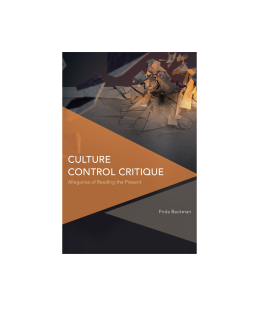
Additional Information
Book Details
Abstract
When “revolution” becomes a recurring theme in mainstream culture, where do we look for the tools for a critical engagement with the present? Addressing the link between allegory and cultural critique in contemporary culture and resisting the thematic abstraction of sexy, fast, revolutionary content, this book suggests that one way is to pay attention not so much to content as to form.
Culture Control Critique provides an analysis of how representations of political systems in contemporary mainstream culture may be understood not so much by looking at their apparent critical message but by shifting our critical gaze to an underlying and recurring political logic that controls the desire for political change.
Frida Beckman is an Associate Professor in the Department of English at Stockholm University in Sweden
Linking control with central concepts such as vision, Culture, Control, Critique offers the reader an impressively wide range of textual examples that examine control through readings from Plato through to reality television. The result is a very thorough study of the nuances of the terms of control, and how it has historically been applied, and how it might be used for theoretical studies of media forms including film, television, and literature.
Felicity J. Colman, Professor of Film and Media Arts, Manchester Metropolitan University
This book is essential reading for anyone interested in the fate of cultural critique at the present moment. Beckman deftly limns out the contours of our contemporary “control society,” and then zeroes in on the current trend for producing cultural productions that take themselves to be allegories of this condition (everything from DeLillo’s fiction to The Hunger Games). This is important work, furthering our ongoing, collective diagnosis of the present
Jeffrey T. Nealon, Edwin Erle Sparks Professor of English and Philosophy, Penn State University
Table of Contents
| Section Title | Page | Action | Price |
|---|---|---|---|
| Contents | 7 | ||
| Acknowledgements | 9 | ||
| Preface | 11 | ||
| Introduction | 15 | ||
| Chapter One: Culture, Control, Critique | 29 | ||
| Chapter Two: Formalism/Allegory/Totality | 47 | ||
| Chapter Three: Space, Allegory, Control | 65 | ||
| Chapter Four: Time, Allegory, Control | 101 | ||
| Chapter Five: Vision, Allegory, Control | 123 | ||
| Chapter Six: Conclusion | 149 | ||
| Bibliography | 163 | ||
| Index | 171 |
